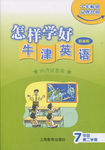题目内容
Due to circumstances ____ our control the performance has had to be cancelled.
A. above B. within C. beyond D. over

 怎样学好牛津英语系列答案
怎样学好牛津英语系列答案People seem not to see that their opinion of the world is also a confession of character.
--R. W. E, erson
It was Mother’s Day, but the young mother was a little unhappy, because she was 800 miles away from her parents. In the morning she phoned her mother to 36 her a happy Mother’s Day, and her mother told her about the beautiful 37 in the garden.
Later that day, when she told her husband about the lilacs(丁香), he said, “I know where we can find 38 that you want. Get the children and come on.” So they went, 39 down the country roads.
There on a small hill, they saw a lot of purple lilacs. The young woman ran quickly to 40 the flowers. 41 , she picked a few here and a few there. On their way home there was a smile on her face.
When they were 42 a nursing home, the young woman saw an old granny sitting in a chair. She had no children with her. They 43 the car and the young woman walked to the old woman, put the 44 in her hands, and smiled at her. The old granny 45 her again and again. She smiled happily, too.
46 the young mother came back to her car, her 47 asked her, “Who is that old granny?” “Why did you give our flowers to her?”
“I don’t know her,” their mother said. “But it’s Mother’s Day, and she has no children. I have all of you, and I 48 have my mother. Just think how much those flowers 49 to her.”
Hearing 50 their mother said, all the children were greatly 51 .
As we know, everyone needs love. In our society, only more love is 52 to the people, 53 those who are in great 54 , we will feel happy. 55 by this, can we have a better life, a more humorous world.
36. A. expect | B. persuade | C. consider | D. wish |
37. A. nature | B. lilacs | C. tree | D. building |
38. A. all | B. something | C. anything | D. nothing |
39. A. walking | B. rolling | C. driving | D. advancing |
40. A. enjoy | B. share | C. compare | D. stress |
41. A. Simply | B. Contently | C. Immediately | D. Carefully |
42. A. watching | B. passing | C. experiencing | D. finding |
43. A. stopped | B. exchanged | C. shook | D. started |
44. A. sweets | B. money | C. flowers | D. care |
45. A. thanked | B. struck | C. touched | D. communicated |
46. A. While | B. When | C. Because | D. Since |
47. A. husband | B. friends | C. children | D. mother |
48. A. hardly | B. never | C. even | D. still |
49. A. meant | B. repeated | C. thought | D. expressed |
50. A. how | B. why | C. what | D. which |
51. A. separated | B. surprised | C. frightened | D. moved |
52. A. combined | B. dragged | C. offered | D. advised |
53. A. especially | B. particularly | C. luckily | D. finally |
54. A. sorrow | B. excitement | C. courage | D. need |
55. A. Then | B. Only | C. So | D. Or |